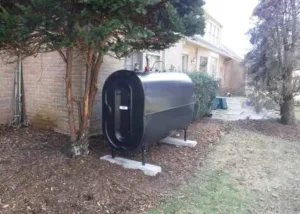The Importance of Oil Tank Replacement in Massachusetts
Oil tank replacement in Massachusetts is a critical maintenance task for homeowners relying on oil for heating, particularly in a state known for its frigid winters. Aging oil tanks, with a typical lifespan of 15 to 20 years, can develop leaks that cause significant environmental damage, including soil and groundwater contamination. The Massachusetts Department of Environmental Protection (DEP) reports thousands of oil spills each year due to deteriorating tanks, underscoring the urgency of timely oil tank replacement in Massachusetts. These spills can lead to costly cleanups, with remediation expenses often reaching tens of thousands of dollars. A new, modern tank not only ensures reliable heating but also enhances safety, complies with stringent state regulations, and protects property value. By prioritizing oil tank replacement in Massachusetts, homeowners can avoid environmental hazards and maintain a dependable heating system.
Recognizing When Replacement Is Needed
Identifying the right time for oil tank replacement in Massachusetts is essential to prevent unexpected failures and costly consequences. Visible signs of wear, such as rust, corrosion, or dents on above-ground tanks, are clear indicators of potential issues. For underground tanks, wet patches or oily residues in the yard may signal leaks. Tanks exceeding 20 years of age often lack modern safety features, such as double-walled construction, proper venting, or emergency shut-off valves, and may not meet current local fire codes or DEP standards. Unexplained drops in oil levels could point to slow, undetected leaks, while outdated tanks are at risk of failing during routine refills, leading to spills. Other warning signs include unusual odors near the tank or inconsistent heating performance, which may indicate internal degradation. Proactive oil tank replacement in Massachusetts mitigates these risks, offering homeowners peace of mind and preventing environmental or financial disasters.
The Step-by-Step Replacement Process
Oil tank replacement in Massachusetts follows a meticulous, regulated process to ensure safety and compliance with state laws. The process begins with securing permits from local authorities, as Massachusetts requires approvals to safeguard the environment. A licensed contractor assesses the site, drains the old tank of any remaining oil, and removes it. For underground tanks, excavation is necessary, often accompanied by soil testing to detect contamination. If contamination is found, remediation must occur before installation proceeds, adhering to DEP guidelines. The old tank is transported to a certified disposal facility to prevent improper handling, which could result in fines.
The installation of the new tank involves selecting a model suited to Massachusetts’ unique environmental conditions, such as its moist, corrosive soil and frequent freeze-thaw cycles. Modern tanks, typically made of corrosion-resistant materials like fiberglass or double-walled steel, are designed to withstand these challenges. The installation process includes connecting the tank to existing piping, adding safety features like overflow alarms and leak detection systems, and securing the tank on a stable concrete or gravel foundation to prevent shifting during freezes. A pressure test verifies the tank’s integrity, ensuring no leaks. For underground installations, the site is backfilled, and landscaping is restored. Compliance with regulations, such as those set by the Massachusetts Board of Fire Prevention, ensures proper tank placement, maintaining safe distances from wells, property lines, and water bodies. This comprehensive approach to oil tank replacement in Massachusetts guarantees a safe, durable heating system.
Benefits of Modern Oil Tanks
Investing in oil tank replacement in Massachusetts delivers a range of benefits that enhance home safety, efficiency, and environmental responsibility. Modern tanks are designed with advanced materials and technology, improving energy efficiency by minimizing heat loss. This can lead to noticeable savings on heating costs, a significant advantage in a state with some of the highest energy prices in the nation. Features like double-walled construction and integrated leak detection systems provide early warnings of potential issues, reducing the risk of spills and costly cleanups. Environmentally, modern tanks align with Massachusetts’ commitment to protecting its waterways and wildlife, as they are less likely to leak and contaminate soil or groundwater.
Beyond efficiency and environmental benefits, new tanks can positively impact home finances. Many insurance providers offer discounts for homes with compliant, modern oil tanks, recognizing the reduced risk of liability. Additionally, a recent oil tank replacement in Massachusetts can increase property value, as prospective buyers prioritize homes with updated, low-maintenance systems. Some modern tanks are compatible with biofuels, supporting Massachusetts’ push toward sustainable energy solutions. By upgrading, homeowners not only improve their home’s functionality but also contribute to the state’s environmental goals, making oil tank replacement in Massachusetts a smart long-term investment.
Regulatory Considerations in Massachusetts
Massachusetts places a strong emphasis on environmental protection, and oil tank replacement in Massachusetts is subject to strict regulations to prevent ecological harm. The DEP mandates immediate reporting of any oil spills, with fines for non-compliance reaching up to $25,000 per violation. Regulations also require the use of corrosion-resistant materials, particularly in ecologically sensitive areas like Cape Cod, the Berkshires, or near wetlands. Homeowners must ensure tanks are installed by licensed professionals who follow state guidelines, including proper placement and safety feature requirements. For underground tanks, soil testing and remediation are critical steps to prevent groundwater contamination, which can have far-reaching effects on local ecosystems.
The state provides resources, such as DEP guidelines and local fire department regulations, to help homeowners navigate the process of oil tank replacement in Massachusetts. By adhering to these rules, homeowners contribute to cleaner waterways, healthier ecosystems, and safer communities. Compliance also protects against legal and financial penalties, making it a crucial aspect of the replacement process. Working with experienced contractors familiar with Massachusetts’ regulations ensures a smooth, lawful upgrade.
Planning for Long-Term Success
Effective planning is key to a successful oil tank replacement in Massachusetts. Homeowners should begin by scheduling regular inspections to assess the condition of their current tank, ideally every 3 to 5 years for older systems. Consulting with licensed professionals helps determine the best tank type—above-ground or underground, steel or fiberglass—based on the property’s needs and environmental conditions. Budgeting for replacement costs, which can range from $2,000 to $10,000 depending on tank type and site conditions, allows for financial preparedness. Homeowners should also factor in potential remediation costs if contamination is detected during excavation.
Maintaining detailed records of tank maintenance, inspections, and replacement history is essential for regulatory compliance and future planning. These records can also streamline insurance claims or property sales, demonstrating a well-maintained heating system. Homeowners should stay informed about evolving state regulations and consider tanks compatible with emerging technologies, such as biofuels, to future-proof their investment. By treating oil tank replacement in Massachusetts as a proactive measure, homeowners can avoid emergencies, reduce environmental impact, and ensure a reliable, eco-friendly heating system for decades.
Choosing the Right Contractor
Selecting a qualified contractor is a critical step in oil tank replacement in Massachusetts. Look for professionals licensed by the state and experienced in handling both above-ground and underground tanks. Reputable contractors should provide proof of insurance, references, and a clear outline of the replacement process, including permit acquisition and compliance with DEP and fire safety regulations. Comparing quotes from multiple contractors ensures competitive pricing while prioritizing those with a strong track record in environmental compliance. Homeowners can check reviews on platforms like the Better Business Bureau or local community forums to verify reliability. A skilled contractor will also offer guidance on tank selection, factoring in Massachusetts’ climate and soil conditions, ensuring a durable and efficient installation.
Environmental and Community Impact
Oil tank replacement in Massachusetts extends beyond individual homes, contributing to broader environmental and community benefits. By upgrading to modern, leak-resistant tanks, homeowners help protect Massachusetts’ natural resources, including its rivers, lakes, and wildlife habitats. Preventing oil spills reduces the burden on local ecosystems and public health, as contaminated groundwater can affect drinking water supplies. Additionally, compliant replacements support community safety by reducing fire hazards and aligning with local fire codes. Homeowners who prioritize oil tank replacement in Massachusetts play a vital role in fostering sustainable communities and preserving the state’s natural beauty for future generations.




Leave A Comment